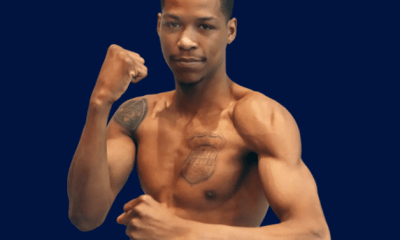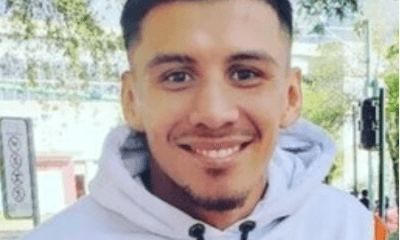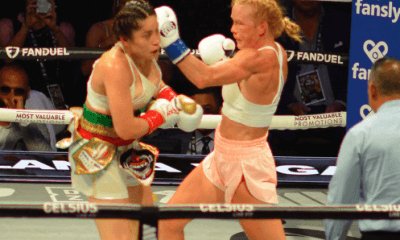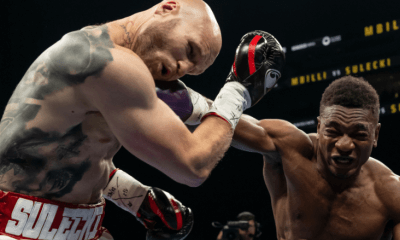Featured Articles
Three Punch Combo: Arboleda-Velez, a Road Map for Demetrius Andrade and More
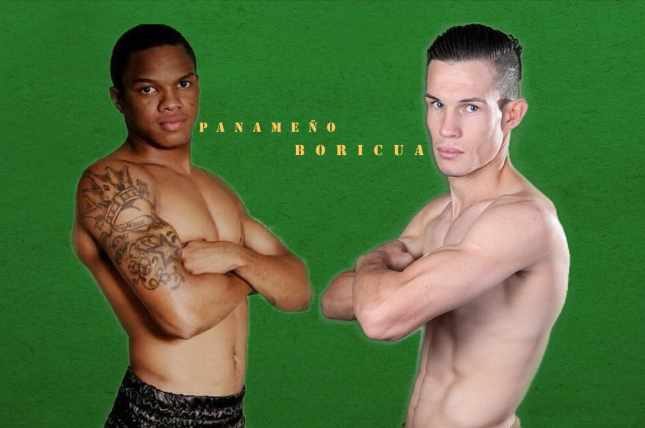
THREE PUNCH COMBO — Young power punching prospects carry a lot of intrigue in this sport. Not only are they exciting to watch but many seemingly carry raw talent that sometimes turns into greatness. On Saturday as part of the Showtime televised tripleheader from the PPL Center in Allentown, PA, we get to see such a power punching prospect in Panama’s Jaime Arboleda (15-1, 13 KO’s) who takes on Puerto Rican veteran Jayson Velez (29-5-1, 21 KO’s) in a scheduled twelve round 130-pound contest.
Arboleda, 25, not only possesses natural raw power but has quite a bit of athleticism. He stands 5’11” which often gives him a big height advantage. As such, he has developed a very strong left jab which he likes to work behind to set up his power shots. When he does let the combinations flow, he shows off his quick hands and can let go of several shots in a row before his opponent can react.
Arboleda’s best punch is his left hook and he looks to work that punch to both the head and body. In his last fight against then 26-2 Victor Betancourt, Arboleda landed a crunching left hook to Betancourt’s body in the first round that put Betancourt down in pain and led to an early win by stoppage.
But there are also questions about him, in particular his chin. In Arboleda’s only career defeat, he suffered a devastating one punch knockout loss to journeyman Recky Dulay.
In that fight, Arboleda weighed north of 140 pounds which was easily his career high. So maybe Arboleda didn’t take the fight serious and as such was lackadaisical in his preparation. We have seen prospects suffer early knockout defeats in fights in which they were ill-prepared, only to bounce back and show what they can do when properly motivated. Will this be the case for Arboleda or is he in fact chinny?
I think we will find out the answer when he faces Velez, a durable veteran who has never been stopped. Velez has heavy handed power in both fists and will be willing to press forward and take a few punches to get the opportunity to land his own clean counter shots.
Personally, I have high expectations for Arboleda and think that performance against Dulay was an aberration. On Saturday night we will almost certainly know if he is in fact the real deal or just another promising prospect who couldn’t rise to the occasion.
What I’d Like To See Next For Demetrius Andrade
Making the third defense of his WBO middleweight title, Demetrius Andrade made easy work of an overmatched Luke Keeler, stopping Keeler in the ninth round last Thursday in Miami. Many in boxing have faulted Andrade for building his undefeated record (29-0, 17 KO’s) against suspect opposition and want to see the soon-to-be 32-year-old boxer in a big fight.
Of course, not having had a big fight is not necessarily his fault. He is a slick southpaw with quick hands. He isn’t easy to hit clean and he can be very quick to counter any swings and misses from his opponents. For big name fighters such as Canelo Alvarez and Gennady Golovkin, he represents too high a risk with too little a reward.
During the DAZN telecast of Andrade’s defense against Keeler, Jermall Charlo was mentioned as a possible future opponent. Like Andrade, Charlo also holds a middleweight title belt. Also, like Andrade, Charlo is undefeated and seeking a big fight. Sounds like a natural match, but this is not a fight I personally want to see.
As we all know, styles make fights and frankly the styles of Andrade and Charlo would make for one extremely tactical fight. As a matter of fact, I would go as far as saying it would resemble the recent lightweight title fight between Robert Easter Jr. and Rances Barthelemy. That fight offered a cure for insomnia.
Andrade employs a cautious tactical style. He is a natural counter puncher and only takes calculated risks. I am not saying that is a bad thing but that is his style and he is not going to change what has got him to this point in his career. For example, he had Keeler hurt and down in both the first and second rounds but did not get overly aggressive seeking an early stoppage.
Charlo’s style is very similar. He too is a natural counter puncher and can be content to just take what an opponent gives him. He is perhaps a little more aggressive than Andrade but only when the situation presents itself and he is confident his opponent can’t hurt him.
I just can’t see Andrade-Charlo playing out any way other than two cautious safety-first fighters poking and prodding at each for twelve rounds.
Instead of Charlo, I’d like to see Andrade in with an aggressive pressure fighter. As such, the one name that makes the most sense to me is Sergiy Derevyanchenko.
Derevyanchenko is, of course, coming off a hard-fought loss to Golovkin. As a matter of fact, some thought he should have gotten the decision. He is a hard-nosed pressure fighter who is not afraid to move his hands and has plenty of skill. He is going to ask questions of Andrade and force Andrade to fight. It’s a perfect match in my opinion and I hope we see it put together later this year.
Under the Radar Fight
On Saturday at the Sheffield Arena in the United Kingdom, former welterweight champion Kell Brook (38-2, 26 KO’s) returns to the ring after a 14-month absence to face Massachusetts invader Mark DeLuca (24-1, 13 KO’s) in a contest to be broadcast in the United States on DAZN. While this intriguing contest should be fan friendly, at the very least, it is a fight on the undercard that really piques my interest.
Coming off his first career defeat when he dropped a close twelve round decision to featherweight champion Josh Warrington, Kid Galahad (26-1, 15 KO’s) takes on Claudio Marrero (24-3, 17 KO’s) in a crucial featherweight tilt. Given their respective styles, I think we see an all-action fight.
Galahad is an aggressive pressure fighter who is not afraid to mix it up. While he often starts off from a southpaw stance, he will often switch to the orthodox. Regardless, he will press forward behind the jab looking to set up power punching combinations. Galahad may not have the quickest hands but has enough power in both of his fists to garner his opposition’s respect.
Marrero has had quite an up-and-down career but once again finds himself on the verge of a big fight after a mild upset of the up-and-coming Eduardo Ramirez in June. Similar to Galahad, Marrero is an aggressive pressure fighter by trade. He will press forward from the southpaw stance behind the right jab looking to set up his power shots. He possesses decent hand speed and heavy-handed power in both fists.
It should be noted that neither Galahad nor Marrero is noted for their defensive prowess. Given their aggressive styles with lack of attention to defense, I think this fight will end up stealing the show.
Check out more boxing news on video at The Boxing Channel
To comment on this story in The Fight Forum CLICK HERE
-

 Featured Articles3 weeks ago
Featured Articles3 weeks agoAvila Perspective, Chap. 330: Matchroom in New York plus the Latest on Canelo-Crawford
-

 Featured Articles2 weeks ago
Featured Articles2 weeks agoVito Mielnicki Jr Whitewashes Kamil Gardzielik Before the Home Folks in Newark
-

 Featured Articles4 weeks ago
Featured Articles4 weeks agoAvila Perspective, Chap 329: Pacquiao is Back, Fabio in England and More
-

 Featured Articles3 weeks ago
Featured Articles3 weeks agoOpetaia and Nakatani Crush Overmatched Foes, Capping Off a Wild Boxing Weekend
-

 Featured Articles2 weeks ago
Featured Articles2 weeks agoCatching Up with Clay Moyle Who Talks About His Massive Collection of Boxing Books
-

 Featured Articles4 weeks ago
Featured Articles4 weeks agoFabio Wardley Comes from Behind to KO Justis Huni
-

 Featured Articles1 week ago
Featured Articles1 week agoMore Medals for Hawaii’s Patricio Family at the USA Boxing Summer Festival
-

 Featured Articles4 weeks ago
Featured Articles4 weeks agoDelving into ‘Hoopla’ with Notes on Books by George Plimpton and Joyce Carol Oates

